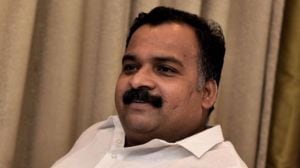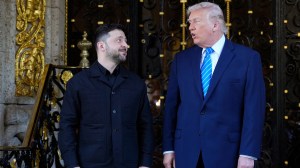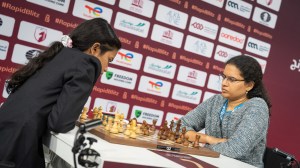Coming up: Floor test
The suggested parliamentary debate on the 123 agreement will be among the most important discussions held in...

The suggested parliamentary debate on the 123 agreement will be among the most important discussions held in Parliament in Independent India. It will be a test for all political parties in terms of their approach to India8217;s national interest.
The Indian nuclear weapons programme was based on a national consensus and had the support of the two major parties 8212; the Congress and BJP. All Congress prime ministers from Indira Gandhi onwards had nurtured the programme. It was Rajiv Gandhi who ordered the assembly of weapons in March 1989 in the wake of incontrovertible proof of Pakistan having gone ahead with the manufacture of nuclear weapons with Chinese help.
Narasimha Rao operationalised the Indian nuclear weapons programme, and when demitting office, strongly advised his successor, Atal Bihari Vajpayee, to go ahead and conduct the nuclear test. Though the test could not be conducted in 1996, Vajpayee carried it out it in May 1998. Some second rung Congress leaders protested against the test, but Rao and Manmohan Singh did not criticise the tests. National interest won over party interests.
The Shakti tests were the starting point for India to be taken seriously by the international community. India began to be considered as one of the potential balancers of power in the world. The NDA government embarked on a policy of engaging all major powers and particularly the US which Prime Minister Vajpayee called India8217;s 8216;natural ally8217;. The NDA government initiated a dialogue with the US on the next steps in strategic partnership NSSP, the core programme of which was freeing India from the technology apartheid. The NDA policy in regard to the US and other major powers of the world was continued by the UPA government. The result is the present 123 agreement which is to be operationalised.
The 123 agreement is being opposed by the Left parties and they are attempting to mobilise other parties of the UNPA to oppose it in the forthcoming session of Parliament. Unlike the two major national parties 8212; the Congress and BJP 8212; the Left has always been opposed to India going nuclear. They are also not very enthusiastic about nuclear energy. They appear to favour an isolationist policy 8212; which they call an independent foreign policy 8212; for India. They are also opposed to economic and social liberalisation and the strategy of high economic growth. However, they extended their parliamentary support to the Congress in true balance of power strategy to keep their greater adversary, the BJP, out of office. Now on the issue of operationalising the 123 agreement they threaten to combine with the NDA and withdraw support to the UPA.
Surely on the issue of national interest in terms of the nuclear arsenal, engagement with the international system and getting the technology apartheid lifted, there are basic contradictions between the two major parties on one side and the Left. There are differences between the UPA and NDA on details in respect of the 123 agreement. But on the objective of sustaining the nuclear arsenal, securing freedom from technology apartheid and enhancing the relationship with US, there are no differences between the two alliances.
What is in the NDA8217;s interest? It has some shared interests with the UPA 8212; such as nuclear arsenal, enhancement of relationship with US, economic reforms and engagement with the international community 8212; but none with the Left Front. The NDA has a fruitful relationship with the Indo-US community which has staked a lot on seeing the Indo-US nuclear deal through. Eminent analysts like the former National Security Adviser Brajesh Mishra are of the view that if the NDA can obtain assurances on certain issues in the 123 agreement it should be allowed to go through. The efforts of the Left Front to mobilise a third front are also not in the NDA8217;s interests. The NDA, as a ruling party of the past which initiated the paradigm shift and one that hopes to rule again at the Centre, would not like India8217;s and the Indian prime minister8217;s credibility to be damaged as the Left has tried to do by insisting that the country repudiate the 123 agreement.
The Left Front has proclaimed that a parliamentary debate would reveal that the deal has no majority support in Parliament. It is not quite clear whether the Left will withdraw its threat to revoke its support to UPA if it finds that a majority in Parliament is not against the 123 agreement. Even if does not, the defeat of the Left8217;s move to mobilise a parliamentary majority against the deal will humiliate the Left.
There is a good case for the NDA to support the 123 agreement after obtaining the assurances suggested by Brajesh Mishra. In case the Left and UNPA succeed in getting a resolution in Parliament for vote it is in the interest of the NDA to vote against it or abstain.
There is a legitimate complaint that there is not adequate communication between the major parties on the nuclear issue. Unfortunately the origin of this was the Shakti tests when no credit was given to the Congress prime ministers for building the nuclear arsenal. In spite of that, the UPA is continuing the policies of the NDA in national interest. It may be recalled that when a UPA minister called the Shakti tests a mistake, that was repudiated by the PM. In the same spirit, the NDA should sustain the policy it initiated with its NSSP declaration in 2003 and support the 123 agreement which is a further evolution of the NSSP. Shared national interest must prevail and party rivalries can be settled at the polls.
The writer is a senior defence analyst
- 01
- 02
- 03
- 04
- 05































